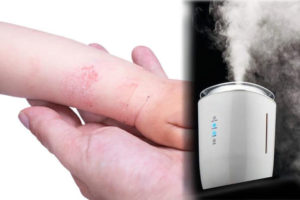
But how does that help you? It’s simple. To get rid of eczema, most of the time, all you need to do is to keep your skin moisturized. So, if the air you’re breathing is relatively humid, the problem will solve itself – without you having to continuously rely on medicine.
However, since no humidifier has the same features as the next one, its purchase can be rather troublesome. To pick a good model, you need to inform yourself. So, by reading this guide, you will learn about what to look for when shopping for a humidifier for eczema.
Best Humidifier for Eczema Comparison Chart
| PRODUCT | DETAILS | ||
|---|---|---|---|
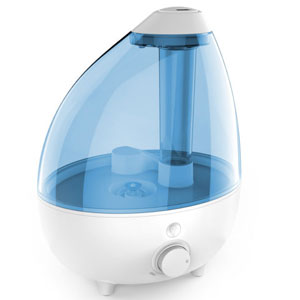 | Pure Enrichment MistAire XL Ultrasonic Cool Mist Humidifier |
| View On Amazon |
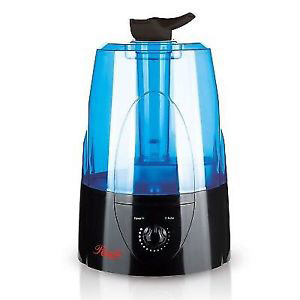 | Rosewill Ultrasonic Cool Mist Humidifier |
| View On Amazon |
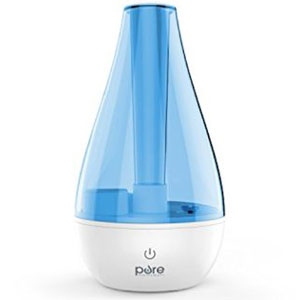 | Pure Enrichment MistAire Studio Ultrasonic Cool Mist Humidifier |
| View On Amazon |
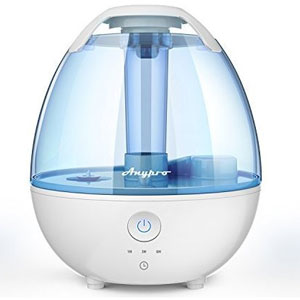 | Anypro Cool Ultrasonic Mist Humidifier |
| View On Amazon |
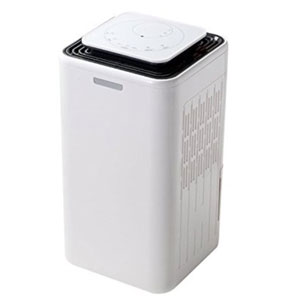 | Eurgeen Touch Screen Dehumidifier |
| View On Amazon |
Symptoms of Eczema
The moment your body is exposed to something that can make you feel ill, your immune system steps into the frontline. As a result, it will start a cycle of chemical changes that will aid your body in warding off your disease.
Not every substance can trigger a reaction, however – and what may seem harmful for you will not be the same for someone around you. Some of these substances may cause your body to react and they are generally known as allergens. Your body reacts to these allergens in the form of allergic reactions – one of them being eczema.
Eczemas are also referred to as “delayed allergies” since you don’t get the reaction right away. Most of the time, it can take up to 48 hours for it to manifest – which is why, sometimes, you won’t even know what caused it.
Every person experiences eczemas differently. Some people have it only on their face – others on their entire body. Also, every reaction manifests itself differently, depending on the allergen and your own immune system. However, some of the most common symptoms of eczema are:
- Itchy skin that feels warm and tender to the touch.
- Red bumps that may crust, drain, or ooze.
- Pain or a burning sensation to the skin.
- Red, dry, or rough skin.
- Raw, scaly, or thickened skin.
- Rashes and/or inflammation.
- Cuts
To get rid of eczema entirely, you need to find out what caused it in the first place. However, you can also treat it on the spot and ameliorate the symptoms using medication and a good humidifier for eczema.
Types of Eczemas
As mentioned, eczemas are not the same for everyone – and they may come in various shapes and forms. In order to know precisely what you are suffering from, here are the most common types of eczemas that many people seem to have:
Atopic Dermatitis
Atopic Dermatitis is a type of eczema that is inflammatory and chronic. It is unknown exactly what causes it – but we do know that it’s our body’s method of protecting itself from an allergen. Our immune system enters “overdrive mode” – and it tries to suppress the allergy by “flaring up.”
This is the most common form of eczema, and it generally starts with childhood – sometimes even during the first few months of your life. Sometimes, it’s genetic and other times, it is triggered by continuous exposure to a certain product. You don’t even have to touch the allergen in order to have a reaction.
The symptoms are what you would expect from eczemas: itching, redness, rashes, dry and scaly skin, and “weepy” sores.
Contact Dermatitis
Contact dermatitis is similar in a way with atopic dermatitis – only that it happens when your body comes into direct contact with the allergens. While the symptoms do not always appear immediately, they flare up within a few hours. When people have a reaction caused by contact dermatitis, their skin generally becomes red, starts itching, and feels like it is burning.
Contact dermatitis can have a variety of causes. However, most of the time, it is caused by solvents and chemicals – but it can also happen after touching common allergens such as pollen, wool, or anything that your body might not accept. Generally, thanks to the quicker reaction of contact dermatitis, people can figure out right away what caused it.
Dyshidrotic Eczema
This eczema type generally appears on the edge of your toes, fingers, palms, or soles of your feet. It can have several causes, going from stress to contact with nickel or other allergens. Generally, contact with certain types of metal is what triggers an allergic reaction for this eczema.
The symptoms are the same, with the addition of blisters and flaking. If the eczema is fairly bad, some can also feel pain – at least for a couple of days, until it has been treated.
Nummular Eczema
Nummular eczema manifests itself rather differently compared to other eczema types. Instead of itching and developing redness all over the place – with no particular pattern – this one features round-shaped lesions. Generally, this eczema is fairly difficult to treat – and it is made even worse if the air is dry and cold.
Seborrheic Dermatitis
Some people refer to this as dandruff; however, it is a bit more than that. Granted, severe cases of dandruff can become seborrheic dermatitis – but this condition is not only limited to the scalp. It can appear on your face or upper back as well – and practically, every place that has sebaceous (oil-producing) glands.
It is not exactly certain what causes seborrheic dermatitis, although it is believed that hormones and genes play an important role. Sometimes, it can appear because of microorganisms such as yeast that lives under your skin and contributes to this condition.
The symptoms are pretty much the same for every person suffering from this condition. The skin feels greasy, swollen and itchy – with yellowish or white crusty flakes.
Stasis Dermatitis
Stasis dermatitis looks similar to atopic and contact dermatitis – but in fact, it goes a bit further than that. This problem usually occurs when a problem to the blood flow happens – one which puts your brain under pressure. This pressure will cause the vessels to break, leaking fluids into your skin – and causing what is known as stasis dermatitis.
Symptoms of stasis dermatitis include redness, swelling around the ankles, itching, scaling, and pain. In some severe cases, it can also lead to open areas (larger ulcers, cracking), oozing, and/or infection.
Generally, stasis dermatitis should pass within one or two weeks given the proper healing environment – but if it doesn’t, you must contact your doctor. This should particularly be the case if your stasis dermatitis has reached a severe stage.
Using a Humidifier to Manage Eczema
Dry skin can pack so many cracks that it may look similar to a desert landscape. However, if you add moisture to it, the surface should become smoother – and this applies to both the sand and the skin.
So, what can you do in this case? Obviously, you expose yourself to areas that are fairly humid. That is, however, easier said than done – since some places don’t really pack the humidity than you need.
So, you go for the next best thing: you get the best humidifier for eczema. That is fairly simple to do since you don’t have to do anything complicated or special with this unit. All you have to do is turn it on.
However, you must be particularly careful when using a humidifier to manage eczema. Not only do you have to ensure that there is enough humidity; you also have to ensure that there isn’t too much of it. To manage eczema, you must keep the humidity levels somewhere around 40%.
Also, make sure that you spend enough time around the humidifier and that you use distilled water with it. This will make 100% sure that your skin stays away from any potential irritants.
If you are using the humidifier to treat eczema, you need to ensure the allergens are kept at bay – which is why you should maintain the unit as clean as possible. Wipe it clean every day, change the filters often, and perform a deep cleanse once a week.
How Humidifiers Help Eczema
When you’re going through a “flaring episode,” your skin becomes very sensitive to everything – even to the air that touches it. If the air is very dry, your skin will start cracking even more – which won’t really help your cause of managing your eczema.
A humidifier won’t bring any fancy treatments or medicine to the table – but it will provide the right environment for your skin to heal itself. As mentioned, the eczema is your immune system’s way of fighting off the allergen – so normally, the skin will heal itself in two weeks at most.
By adding the right level of humidity into the process, the skin will heal itself even faster. Since the skin will be moisturized by the air itself, your eczema will be managed, and the flare-ups will be “cooled down.”
Types of Humidifiers That Can Prevent Eczemas
Generally, as long as they humidify the air, all types of humidifiers should be effective in treating eczemas. The idea is to make sure that your skin stays hydrated – therefore preventing it from drying and flaring up. Very humid air, though, may turn out to be problematic. This is why looking for a dehumidifier may also be a good idea. In fact, why don’t you drop by our Humidity Expert home page and see all the guides on air quality machines we have prepared.
All things considered, here are the types that you should look for:
Warm Mist Humidifiers
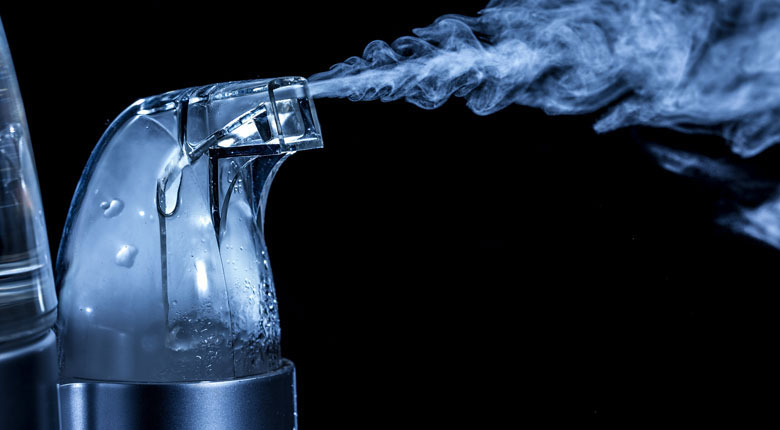
Thanks to the warm mist released, these units are best used during winter when the climate is cold. This will make the air more breathable and less harsh. So, it will be less likely for your skin to flare up.
Compared to other dehumidifiers, this type is fairly quiet and perfect for nighttime use. The only thing you will probably hear from these dehumidifiers is the sound of boiling water.
These units need to be cleaned frequently, lest they become a breeding ground for bacteria. The air needs to be clean if you want your eczema to go away.
Ultrasonic Humidifiers
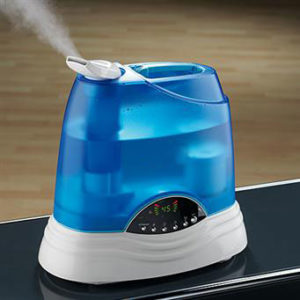
Unlike most humidifier types, this one does not stick with a particular type of mist – but instead, it allows you to choose. You can go for cool or warm mist, depending on the season that you are using it in. This way, you can prevent eczema all year round, and is often used as a humidifier for allergies as well.
Ultrasonic humidifiers use high-frequency vibrations to create mist – a technology that is generally very quiet. This is why they are the perfect option for bedrooms and offices – since they are most of the time noiseless.
The only thing you may hear is the sound of mist being diffused in the room. However, the noise is almost inaudible – and most people often do not even notice it.
Impeller Humidifiers
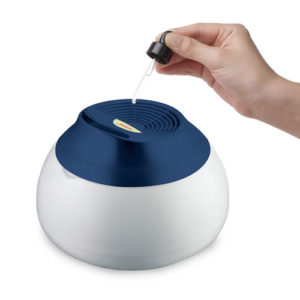
These humidifiers do not have filters, which is why you should deep-clean it at least twice a week. Failing to do so will cause bacteria to spread – which won’t help your eczema much. Ideally, you should use these products with distilled water – to prevent the bacteria from spreading.
However, they are among the cheapest humidifiers on the market – making them the perfect choice for those who are shopping on a budget.
Evaporative Humidifiers
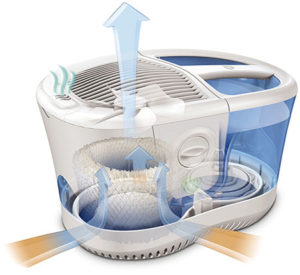
On the same basis, this is a good humidifier for eczema, since it keeps your skin hydrated. It’s among the most hygienic options since it features a filter that traps bacteria and dust. This way, the air will be cleared of allergens – so your eczema will not have a chance to break out.
Like any other humidifier, in order for the evaporative models to remain effective against eczema, they have to be cleaned quite often. If you don’t do that, the water may become stagnant – and the gathered bacteria may cause your eczema to flare up.
Wrap Up
Eczemas are very annoying – which is why you want to avoid them as much as possible. They take longer to heal, and you risk getting scar tissue for life. Only the best humidifier for eczema can keep it under control.
Generally speaking, any good quality humidifier should be able to help with your eczema. The only condition is that you keep the humidity at an appropriate level – meaning, around 40%. This is why you may want to go for a model that allows you to control the humidity.
However, the best way to treat eczema is to prevent it entirely. Thus, as long as the air is clean and relatively humid, you should be alright. Hopefully, now you know what to look for in a humidifier. Remember: search for humidifiers that have a bacteria-trapping filter, and don’t forget to clean your unit as often as you can.
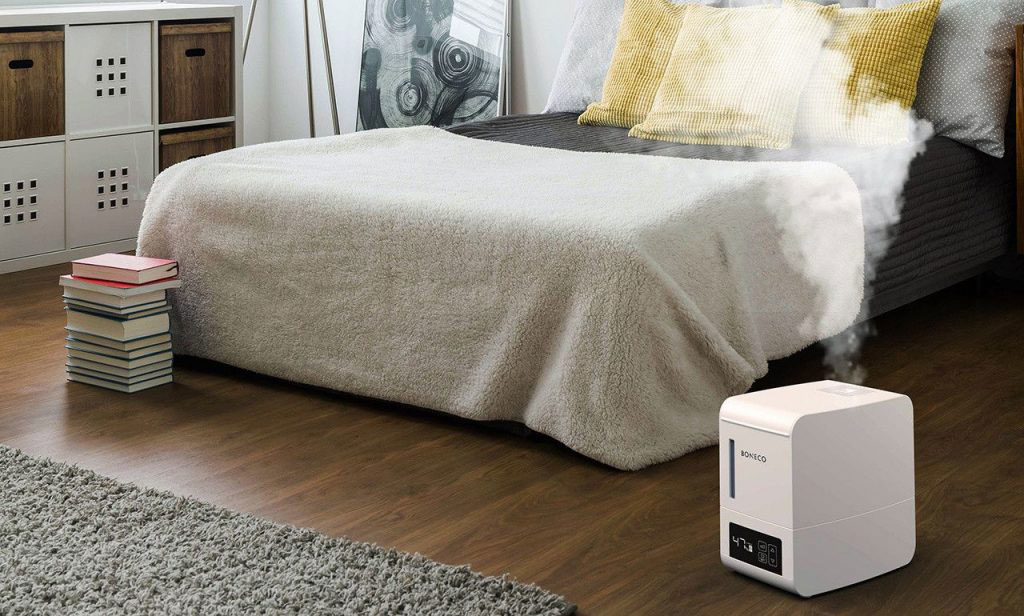
Leave a Reply